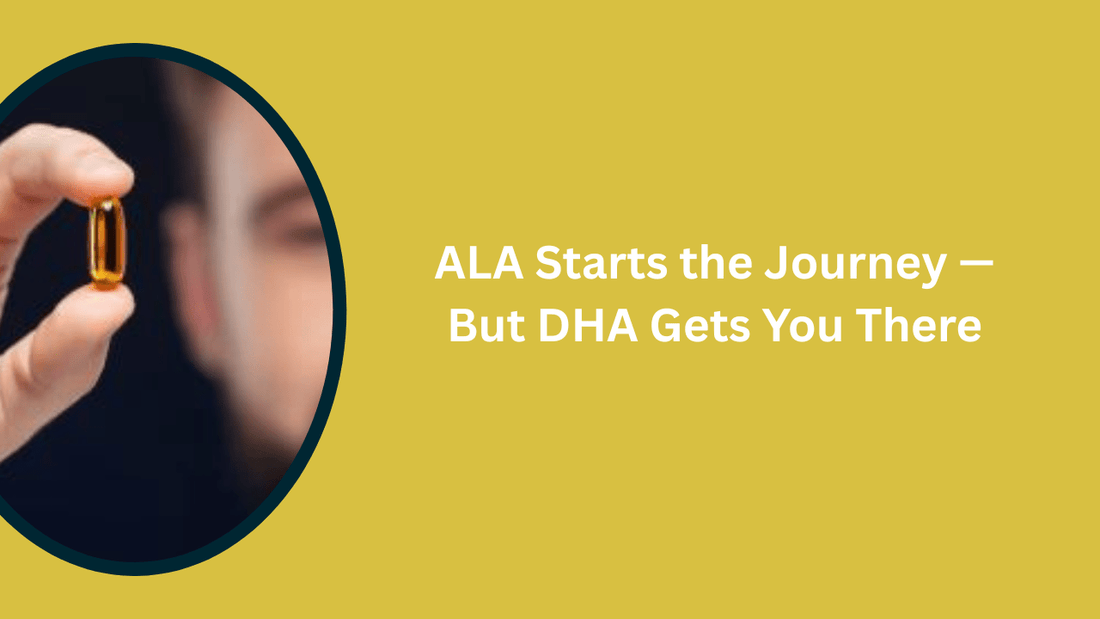Introduction
As more people move toward plant-based lifestyles, getting the right balance of omega-3 fatty acids becomes a crucial topic—especially when it comes to brain, heart, and eye health.
You’ve likely seen ALA (Alpha-Linolenic Acid) and DHA (Docosahexaenoic Acid) listed on omega-3 supplements, but what’s the real difference between them? And why should vegetarians and vegans be especially mindful of which one they’re consuming?
In this article, we’ll explore the key DHA ALA differences, the role of plant omega DHA, and how to make the smartest supplement choice for optimal wellness.

What Are Omega-3 Fatty Acids?
Omega-3s are essential polyunsaturated fats that your body needs but can’t produce on its own. They support critical functions like:
-
Brain and nervous system development
-
Heart and vascular health
-
Eye function and vision
-
Inflammation control
There are three main types of omega-3 fatty acids:
-
ALA (Alpha-Linolenic Acid) – short-chain
-
EPA (Eicosapentaenoic Acid) – long-chain
-
DHA (Docosahexaenoic Acid) – long-chain
Let’s zoom in on the plant-based omega-3s — ALA and DHA.

ALA: The Plant-Based Starting Point
ALA is the most common plant-sourced omega‑3, found in foods like:
-
Flaxseeds
-
Chia seeds
-
Walnuts
-
Hemp seeds
While ALA is classified as an essential fatty acid (you must get it through diet), it’s only the starting point in the omega-3 pathway. Your body must convert ALA into EPA and DHA—the active forms that truly power your brain and heart.
⚠️ Here’s the catch:
Most people convert less than 10% of ALA into DHA.
In vegetarians and vegans, this conversion rate can be even lower due to the lack of dietary EPA and DHA from fish or marine sources.
DHA: The Long-Chain MVP
DHA is a long-chain omega‑3 fatty acid, found abundantly in:
-
Cold-water fish (salmon, mackerel, sardines)
-
Marine microalgae (plant-based DHA source)
DHA plays a direct role in brain cell structure, memory, and retinal function. It’s essential during pregnancy, infancy, and throughout adult life to:
-
Maintain brain volume and cognitive clarity
-
Reduce risk of depression, Alzheimer’s, and other neurodegenerative conditions
-
Support eye health and prevent age-related vision loss
Unlike ALA, DHA does not need conversion. It is ready to be used by your cells right away.

DHA vs ALA: What’s the Difference?
| Aspect | ALA (Alpha-Linolenic Acid) | DHA (Docosahexaenoic Acid) |
|---|---|---|
| Type | Short-chain omega-3 | Long-chain omega-3 |
| Found in | Flax, chia, hemp, walnuts | Fish, marine algae |
| Conversion Required | Yes (into DHA/EPA) | No – biologically active as-is |
| Brain & Eye Support | Limited | High – DHA is a major structural fat |
| Best For | Basic dietary omega-3 intake | Targeted cognitive & vision support |
| Suitable Plant Source | Easily available | Only from marine microalgae |
Why Plant Omega DHA Matters for Vegetarians & Vegans
If you're on a plant-based diet, you're likely getting some ALA from seeds and nuts — but that's not enough for optimal brain and eye function.
Here’s why plant omega DHA is a must:
🧠 1. Supports Cognitive Health
Low DHA levels have been linked to memory loss, ADHD, and mood imbalances. Since ALA doesn’t convert well, supplementing with algal DHA ensures your brain gets what it needs—without fish oil.
👁 2. Protects Eyes & Vision
DHA is the main structural component of the retina. Deficiency can lead to dry eyes, blurred vision, or even retinal degeneration over time.
🤰 3. Essential During Pregnancy
DHA is critical for fetal brain and eye development. Plant-based pregnant women should ensure they’re getting adequate DHA for both their own body and the baby’s growth.
🌿 4. A Sustainable, Toxin-Free Source
Fish-based DHA may carry heavy metals or environmental toxins. Algal oil (the source of plant omega DHA) is clean, vegan, and environmentally sustainable.
How to Choose the Right Plant-Based Omega Supplement
Not all omega supplements are created equal. When choosing one, look for:
✅ 1. Algal DHA (Not Just ALA)
Check the label for microalgae-derived DHA — this is the only reliable vegan source of long-chain DHA.
✅ 2. Third-Party Lab Testing
Ensure it’s tested for:
-
Potency (amount of DHA per dose)
-
Heavy metals & toxins
-
Purity and shelf-stability
✅ 3. Balanced Formulas
Some advanced supplements combine ALA + DHA + other Omegas (like 5, 6, 7, 9) for broader support. These can be more effective than standalone ALA-only capsules.
✅ 4. GMP-Certified Manufacturing
Choose brands that follow Good Manufacturing Practices to ensure quality, safety, and reliability.
FAQs
❓ Can’t my body convert ALA into DHA?
Technically yes—but very inefficiently. Less than 5–10% of ALA is converted into DHA, and this is often not enough to meet your body’s needs.
❓ Is algal DHA really effective?
Yes. Algal DHA is bioidentical to fish-derived DHA and is a cleaner, plant-based alternative with no toxins or ocean contaminants.
❓ Is ALA completely useless?
Not at all. ALA is still important for heart health and reducing inflammation, but it should be paired with DHA for complete omega-3 coverage.
❓ How much DHA should a vegetarian take?
Experts recommend 200–300 mg of DHA daily for adults, and more during pregnancy or breastfeeding.
Conclusion
Understanding the DHA ALA differences is essential for anyone on a plant-based diet. While ALA is helpful, it simply can’t deliver the high-level brain, vision, and cellular support that DHA provides.
The solution? Choose a plant omega DHA supplement sourced from algal oil—it’s clean, sustainable, vegan, and gives your body the direct long-chain omega-3 it truly needs.
When it comes to your brain and eyes, don’t compromise. Go beyond flax and chia. Fuel your future with real DHA—plant-based and powerful.






